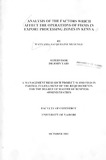| dc.description.abstract | This study is an analysis of the factors that affect the operations of firms in
EPZs with the aim of determining why despite the heavy investment that firms
undertake and the attractive incentives offered by the Government, there have
been cases of withdrawal from the export processing zones in Kenya.
A study of all the firms operating in Export Processing Zones in Nairobi and
Athi River was undertaken. Primary data was collected using a questionnaire
consisting of both open and close ended questions. The questionnaire
consisted of five sections each addressing the different factors that impact on
the operations of the firms. The five sections were directly related to the
reasons for which EPZs were established in Kenya, namely; Employment
generation, skills development, technology transfer, foreign exchange earning
and creation of forward and backward linkages. The questionnaire was
addressed to the General Manager or Managing Director of the firm.
Data was analysed using statistics, proportions, percentages and tables. These
were deemed appropriate due to the qualitative nature of the study. The data is
then presented in the form of bar graphs and pie charts. Majority of the firms
in the EPZs are foreign owned. Most of their investment took place between
1990 and 1995. The major sources of information on EPZs in Kenya are
business contacts.
70% of the EPZ firms in Kenya are labour intensive with 54% of the
workforce being female. The USA and Europe are the major exporters of the
EPZ products, 70% of which are finished products.
After extensive analysis of the factors affecting operations of firms in the
EPZs the study identifies huge expenses incurred due to an ineffective
infrastructure as the main reason for the withdrawal from the scheme. The
power failures of 12.28 - 2000, an ineffective telecommunication system and a poor national road network are the main reasons for the withdrawal from the
scheme.
The results of the study raise a number of issues that could be addressed in
future research. Of key interest would be to determine the extent of marketing
the EPZA undertakes to generate investment into the scheme. One may also
want to determine what specific measures have been undertaken to reduce
incidences of withdrawal from the scheme and the actual contribution of the
EPZs in the overall economic development of the country. | en |

